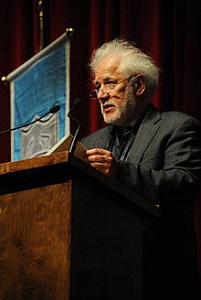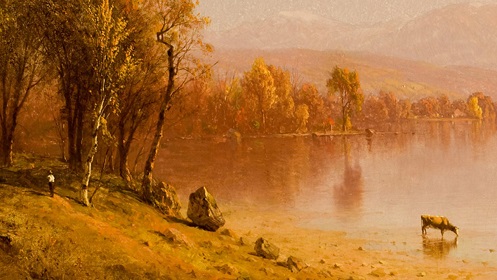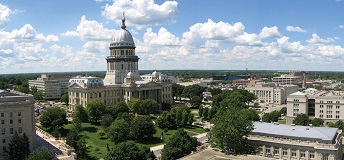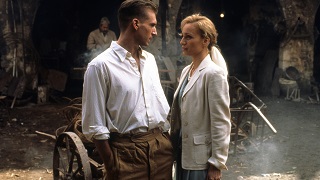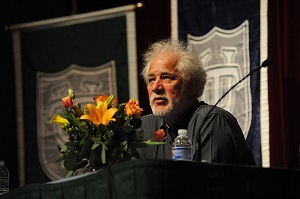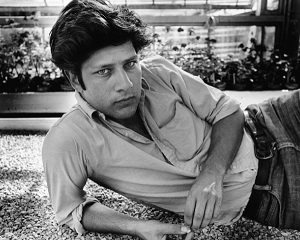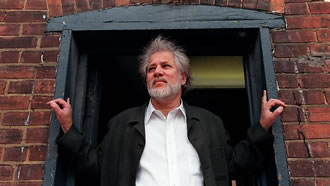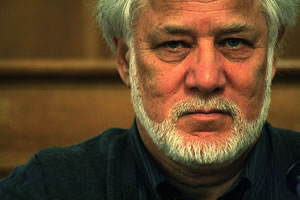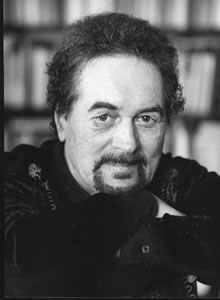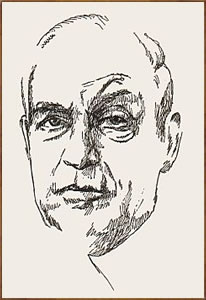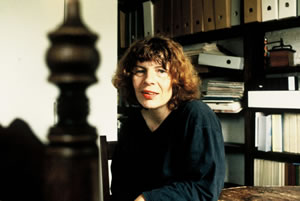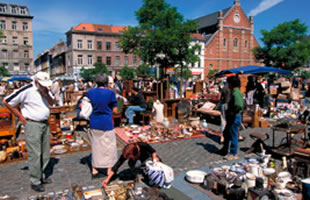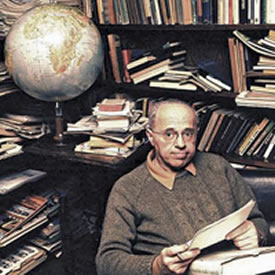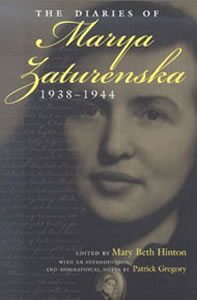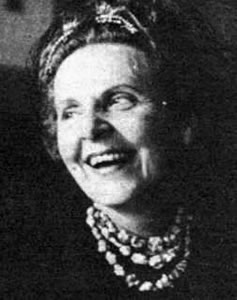De Canadese dichter en schrijver Philip Michael Ondaatje werd op 12 september 1943 geboren in Colombo, Ceylon (nu Sri Lanka). Zie ook alle tags voor Michael Ondaantje op dit blog.
Uit:Warlight
“In 1945 our parents went away and left us in the care of two men who may have been criminals. We were living on a street in London called Ruvigny Gardens, and one morning either our mother or our father suggested that after breakfast the family have a talk, and they told us that they would be leaving us and going to Singapore for a year. Not too long, they said, but it would not be a brief trip either. We would of course be well cared for in their absence. I remember our father was sitting on one of those uncomfortable iron garden chairs as he broke the news, while our mother, in a summer dress just behind his shoulder, watched how we responded. After a while she took my sister Rachel’s hand and held it against her waist, as if she could give it warmth.
Neither Rachel nor I said a word. We stared at our father, who was expanding on the details of their flight on the new Avro Tudor I, a descendant of the Lancaster bomber, which could cruise at more than three hundred miles an hour. They would have to land and change planes at least twice before arriving at their destination. He explained he had been promoted to take over the Unilever office in Asia, a step up in his career. It would be good for us all. He spoke seriously and our mother turned away at some point to look at her August garden. After my father had finished talking, seeing that I was confused, she came over to me and ran her fingers like a comb through my hair.
I was fourteen at the time, and Rachel nearly sixteen, and they told us we would be looked after in the holidays by a guardian, as our mother called him. They referred to him as a colleague. We had already met him—we used to call him “The Moth,” a name we had invented. Ours was a family with a habit for nicknames, which meant it was also a family of disguises. Rachel had already told me she suspected he worked as a criminal.
The arrangement appeared strange, but life still was haphazard and confusing during that period after the war; so what had been suggested did not feel unusual. We accepted the decision, as children do, and The Moth, who had recently become our third-floor lodger, a humble man, large but moth-like in his shy movements, was to be the solution. Our parents must have assumed he was reliable. As to whether The Moth’s criminality was evident to them, we were not sure.
I suppose there had once been an attempt to make us a tightly knit family. Now and then my father let me accompany him to the Unilever offices, which were deserted during weekends and bank holidays, and while he was busy I’d wander through what seemed an abandoned world on the twelfth floor of the building. I discovered all the office drawers were locked.”
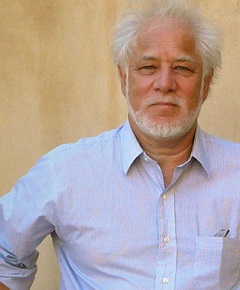
Michael Ondaatje (Colombo, 12 september 1943)
De Amerikaanse schrijver James Frey werd geboren op 12 september 1969 in Cleveland. Zie ook alle tags voor James Frey op dit blog.
Uit: The Calling (Endgame Book 1)
“Endgame has begun. Our future is unwritten. Our future is your future.
What will be will be.
We each believe some version of how we got here. God made us. Aliens beamed us. Lightning split us, or portals delivered us. In the end, the how doesn’t matter. We have this planet, this world, this Earth. We came here, we have been here, and we are here now. You, me, us, the whole of humanity. Whatever you believe happened in the beginning is not important. The end, however. The end is.
This is Endgame.
We are 12 in number. Young in body, but of ancient people. Our lines were chosen thousands of years ago. We have been preparing every day since. Once the game begins, we must deliberate and decipher, move and murder. Some of us are less ready than others, and the lessers will be the first to die. Endgame is simple this way. What is not simple is that when one of us dies, it will mean the deaths of countless others. The Event, and what comes after, will see to that. You are the unwitting billions. You are the innocent bystanders. You are the lucky losers and the unlucky winners. You are the audience at a play that will determine your fate.
We are the Players. Your Players. We have to Play. We must be older than 13 and younger than 20. It is the rule, and it has always been this way. We are not supernatural. None of us can fly, or turn lead
to gold, or heal ourselves. When death comes, it comes. We are mortal. Human. We are the inheritors of the Earth. The Great Puzzle of Salvation is ours to solve, and one of us must do it, or we will all be lost. Together we are everything: strong, kind, ruthless, loyal, smart, stupid, ugly, lustful, mean, fickle, beautiful, calculating, lazy, exuberant, weak.
We are good and evil.
Like you.
Like all.
But we are not together. We are not friends. We do not call one another, and we do not text one another.”
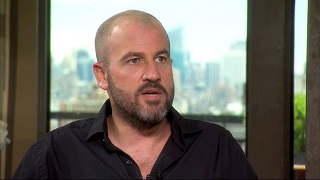
James Frey (Cleveland, 12 september 1969)
De Nederlandse dichter en tekenaar Christiaan Johannes van Geel werd geboren op 12 september 1917 in Amsterdam. Zie ook alle tags voor Chris van Geel op dit blog.
Oktoberkauwen
Wanneer het mist en windstil is
hoor je van kauwen in de bomen
het drukke praten dingend on-
nerveus, het zich verplaatsen zonder
drukte, het huiselijke met
verstand, en je bent thuis als het
oktober is, dichtbij de nacht.
Witte nachtuil
Zij kijkt mij aan met kleine stippen
zij heeft geen naam, weegt niets, geen blad
voelt zich betast hoe stijf ze ook
zich vastklemt straks als ik het wil.
Ze is een driehoek van wit dons,
haar poten haken in mijn hand.
Geluk waar toch geen naam voor is
dan schoonheid die je zelf niet kent.
Je hoort het suizen
er is een betekenis
het is niet zegbaar
je mag het niet verliezen.
Zomer
Het water ligt ontdaan bijna
van water onder stof,
de bomen zien hun eigen ogen
en ik door groen hun groen niet meer,
ze zijn verborgen in de bomen.
De lucht betrekt over het vee –
wanneer het licht zo donker wordt
licht fel het wit van koeien op.
Chris van Geel (12 september 1917 – 8 maart 1974)
De Ierse dichter en schrijver Louis MacNeice werd geboren op 12 september 1907 in Belfast. Zie ook alle tags voor Louis MacNeice op dit blog.
Christina
It all began so easy
With bricks upon the floor
Building motley houses
And knocking down your houses
And always building more.
The doll was called Christina,
Her under-wear was lace,
She smiled while you dressed her
And when you then undressed her
She kept a smiling face.
Until the day she tumbled
And broke herself in two
And her legs and arms were hollow
And her yellow head was hollow
Behind her eyes of blue.
He went to bed with a lady
Somewhere seen before,
He heard the name Christina
And suddenly saw Christina
Dead on the nursery floor.
I Am That I Am
In the beginning and in the end the only decent
Definition is tautology: man is man,
Woman woman, and tree tree, and world world,
Slippery, self-contained; catch as catch can
Which when caught between the beginning and end
Turn other than themselves, their entities unfurled,
Flapping and overlapping—a tree becomes
A talking tower, and a woman becomes world.
Catch them in nets, but either the thread is thin
Or the mesh too big or, thirdly, the fish die
And man from false communion dwindles back
Into a mere man under a mere sky.
But dream was dream and love was love and what
Happened happened—even if the judge said
It should have been otherwise—and glitter glitters
And I am I although the dead are dead.
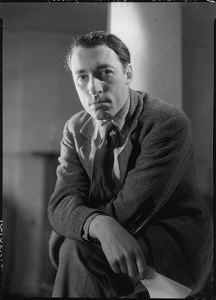
Louis MacNeice (12 september 1907 – 3 september 1963)
De Nederlandse dichteres en schrijfster Hannes Meinkema werd op 12 september 1943 geboren in Tiel. Zie ook alle tags voor Hannes Meinkema op dit blog.
Uit: Een krokodil is een zeer eenzaam dier
“Haar vader viel altijd zomaar haar kamer binnen. Zonder kloppen (wij hebben hier in huis niets voor elkaar te verbergen). Keek achteloos in al haar kasten, waar ze bij zat. Kun je nagaan wat ze doen als je op school bent. Niet te vertrouwen. Voortdurend onveilig in je kamer, of je nu huiswerk maakte of stiekem een boek las.
Maar dat broekje had ze ten minste schoon uitgewassen.
Ze was er.
Ze pakte de tas en liep naar de vooruitgang. ‘Dus we zien je vanavond weer terug’, zei de chauffeur met een grijns naar haar mond. Ze bloosde, vervelend. Ja, ze knikte, ja, struikelde bijna over de treden. Liep snel, te snel, de straat op. De chauffeursogen prikten in haar rug, haar benen (daartussenin). Nu kaarsrechtop lopen, niet zo, niet tè – nee ’t beste toch gewoon maar je hoofd wat laten zakken, verlangen naar een hoek om om te gaan.
Ze had de achteruitgang moeten nemen.
Maar ze was geen kind meer, zelfs de buschauffeur had het gezien.
Om de hoek stopte ze, haalde haar retourkaartje uit haar jaszak, stopte het in haar portemonnee, die in het voorste vakje van haar tas. Haar handen waren klam.
Marjolein woonde niet ver van de halte. Ze kreeg koffie. Ze zat het op een kussen op de grond op te drinken. Mond vol tanden. Gek, ze had zich hier weken op verheugd en nu het zover was kon ze Marjolein niet laten merken wat ze voelde.
‘We gaan naar Artis, vind je dat leuk? Als we om elf uur bij de krokodillen zijn, kunnen we zien hoe ze gevoederd worden. Dat gebeurt maar twee keer per week, dus je boft.’
Marjolein praatte veel. Ze kon er haast niet tussen komen. Het was plotseling erg moeilijk om erover te beginnen. Ze kon beter wachten tot een geschikt moment. In Artis. ‘Ja’, zei ze, ‘ja, dat lijkt me leuk.’
Ze glimlachte expres.
Marjolein leek helemaal niet op haar vader. Ze was ook een stuk jonger natuurlijk. Ze studeerde nog. ‘Hoe oud ben je?’ vroeg ze ineens. ‘Drie en twintig. En jij, veertien?’
‘Dertien.’
Kleiner dan Marjolein had gedacht. Dat maakte het nog moeilijker om het te vertellen. Raar was dat: als je van te voren had bedacht dat je iemand iets ging vertellen, was het veel moeilijker om het te doen dan spontaan. Ja, ze zou wachten tot in Artis.”
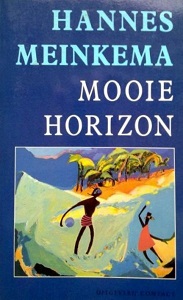
Hannes Meinkema (Tiel, 12 september 1943)
Cover
De Nederlandse columnist, journalist en schrijver Eduard Maurits Elias werd geboren in Amsterdam op 12 september 1900. Zie ook alle tags voor Eduard Elias op dit blog.
Uit: Een bloemetje
“Evenmin als, naar waarheid, ontkend zou mogen worden, dat de journalistiek van de Rotterdamse Zandlopers of de Amsterdamse Kronkels, tot de letterkunde behoren, evenmin zou dat mogen worden gedaan ten aanzien van deze stukken van Annie Salomons.
Ik geloof niet, te mogen zeggen, dat hun poëtische eenvoud geraffineerd is. Dit zou trouwens een contradictio in terminis mogen heten. Niet geraffineerd dus, maar wèl – en dit dan ook ten voile en altijd – verfijnd.
Zo kwam het dat de gewone man zijn ongeduld nog wel eens wist te bedwingen om Straat of Rodenko te lijf te gaan, maar dat, wanneer er een opstel van Annie Salomons in stond, Maatstaf onmiddellijk ter hand genomen werd. Altijd komt het blad met de ochtendpost midden in het werk en menigmaal werden de resten van deze beide tijdelijk terzijde geschoven ‘om eerst Salomons te lezen’. Toen de Ooievaar beide bundeltjes bracht, werden zij daaruit nòg eens gelezen.
Is dit eigenlijk reeds niet genoeg-gezegd door wie bij een kroonjaar zijn hommage brengen wil aan een bewonderde dame?
Of mag ik, uit mijn herinnering, het toch wel verrassende feit constateren, dat ik haar, van het prille begin tot dit zelf-opgelegde einde, ben trouw gebleven over een lange pauze heen?
Want mijn herinnering gaat terug tot de beide Groene’s, die altijd met vreugde en spanning verbeide hoogtepunten van de week voor een gymnasiumjongen met grasgroene litteraire belangstelling. Er is altijd nog wel iets gebleven van de toenmalige heerlijkheid van het-bandje-van-de-verse-bladen-verwijderen, maar de diepe vreugde daarvan, zoals die toen was, lijkt nu onbegrijpelijk. Even onbegrijpelijk als het vroegste geluk om een nieuw-gekocht of gekregen boek, dat met àlles wat het had, een kleine roes verwekte: vóór het lezen al met zijn tastbaarheid: de band en het papier en ook met zijn verse, bijna bedwelmende geur van jonge inkt.”
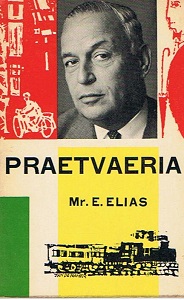
Eduard Elias (12 september 1900 — 14 januari 1967)
Cover
De Nederlandse dichter en hoogleraar Jan Willem (Wim) Schulte Nordholt werd geboren in Zwolle op 12 september 1920. Zie ook alle tags voor Jan Willem Schulte Nordholt op dit blog.
Sonnet
De maat van dit oneindig wijde land
van wilgen, populieren, wilgen en van eiken,
de slag, waarmee een sterke, bruine hand
de riemen in het water neer doet strijken,
de rust, waarmee de wolken rand na rand
opschuiven over slingerende dijken,
de maat van dit oneindig wijde land,
waarvan de einders naar den hemel wijken;
dit is de maat, waarop ik had gedacht,
tussen een sterk, eenvoudig-vroom geslacht,
voorgoed in dit schoon land te willen leven.
Maar al wordt dit geluk mij niet gegeven,
genoeg zal mij, nu ‘k jou heb, zijn gebleven:
ogen, waarin heel Hollands hemel lacht.
Sonnet
Een kind loopt tussen grote mensen door
en het verzamelt in zijn kleine handen
een herfstbouquet van rode blaren voor
de jonge vrouw die zachtjes aan komt wandlen.
Men ziet het dad’lijk dat zij bij hem hoort.
Zij zal zijn moeder zijn, hij heeft haar ogen
maar zijn gezicht is zuiver blank ivoor,
het hare is door het geluk bewogen.
En ik, ik zie het als een dromer aan,
en warm loop ik van het geluk te dromen.
Ik zie daarginds de allerliefste gaan,
ik zie het kind onder de grote bomen,
Ik zie mijzelf diep in haar ogen staan
en ons geluk is eeuwig en volkomen.
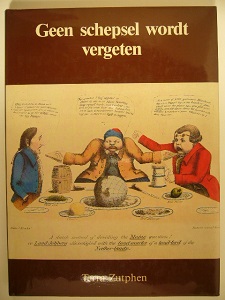
Jan Willem Schulte Nordholt (12 september 1920 – 16 augustus 1995)
Liber amicorum voor Jan Willem Schulte Nordholt ter gelegenheid van zijn vijfenzestigste verjaardag.
De Duitse dichter en schrijver Werner Dürrson werd geboren op 12 september 1932 in Schwenningen am Neckar. Zie ook alle tags voor Werner Dürrson op dit blog.
Grafeneck
Bergaufwärts Linden Kastanien
lichte Allee
der Himmel feinsäuberlich blau
klare Sicht in hüglige Fernen
ich sehe du siehst
der Frühling ist mild
Kein flatterndes Band im Wind kein
Hauch nichts steigt aus den Wiesen
ich frage du fragst wer
karrte die Seelen hinauf
zehntausendfach lieferte Brot
unnützen Essern die
hungern nicht lang
ich spüre du spürst
der Frühling ist lau
Aufwärts durch Linden Kastanien die
Rauchfahne hoch wer drehte
den Hahn auf schürte das Feuer
warf sie hinein wer wusch sich
die Hände mit Seife die
schrie nicht schäumte nicht
Schlaf schöner Schlaf
zehntausendfach siehst du
der Frühling ist blind
Ich frage du fragst niemand weiß
schwarzes Flattern im Wind der
Himmel grauer als grau wer
schob die Schlacke beiseite
kehrte die Asche zusammen wer
grub die Grube säte das Gras
ich höre du hörst die Zeugen
schweigen
der Frühling ist schlau
Dicht geschlossen die Reihen
Linden Kastanien schöne Allee
der Himmel feinsäuberlich klar
kein flatterndes Band im Wind kein
Haar sattes Grün nichts
steigt aus den Wiesen
die Vögel zwitschern
der Frühling ist blau
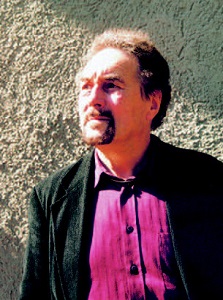
Werner Dürrson (12 september 1932 – 17 april 2008)
De Vlaamse dichter en schrijver Gust Van Brussel werd geboren in Antwerpen op 12 september 1924. Zie ook alle tags voor Gust Van Brussel op dit blog.
Haar stem zingt in mijn ogen
Haar stem zingt in mijn ogen
een albatros wiekt over een verdwijnend schip
de balletdanser opent zijn vleugels
leven dood wonden strelen
zij haalt haar borstjes uit haar cups
het ronde vlees mals
de tepels groeien
ik hoor haar lied in mijn hals
zij krieuwelt in mij
ik heb nood aan haar vingers op mijn tors
haar stem zingt over het zinkend schip
het licht breekt open over de einder
ik houd haar jonge heup gesloten tegen me aan
ik verga in de zee
boven mij wordt de albatros zwart
in de zonneschijf
blijf nu bij me voorgoed
Midden in je tuin staan
Midden in je tuin staan een tuin
vol kleurenlust en weelderig
van roze rozerood tot goudoranje
zwaanwit het korenbloemenblauw
het gele van de avondzon en het paars
midden in je tuin je lievelingslied neuriën
in zoete geuren, teerbitter of anijs
exotisch peper gember citroenzuur
of donker amber
leven midden je fuchsias je gerberas
je aloë en lelies je jasmijn uit Perzië
rode anthurium en witte anjers
lichtrode cuphorbia kerststerren
en lepelplanten de gele alcantaria
en de rozen van overal op de planeet
de koningin pronkend in lange vazen
midden in je tuin staan
waar hoor ik je zingen
in die andere wereld
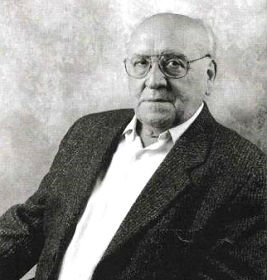
Gust Van Brussel (12 september 1924 – 20 mei 2015)
Zie voor nog meer schrijvers van de 12e september ook mijn blog van 12 september 2015 deel 2.

